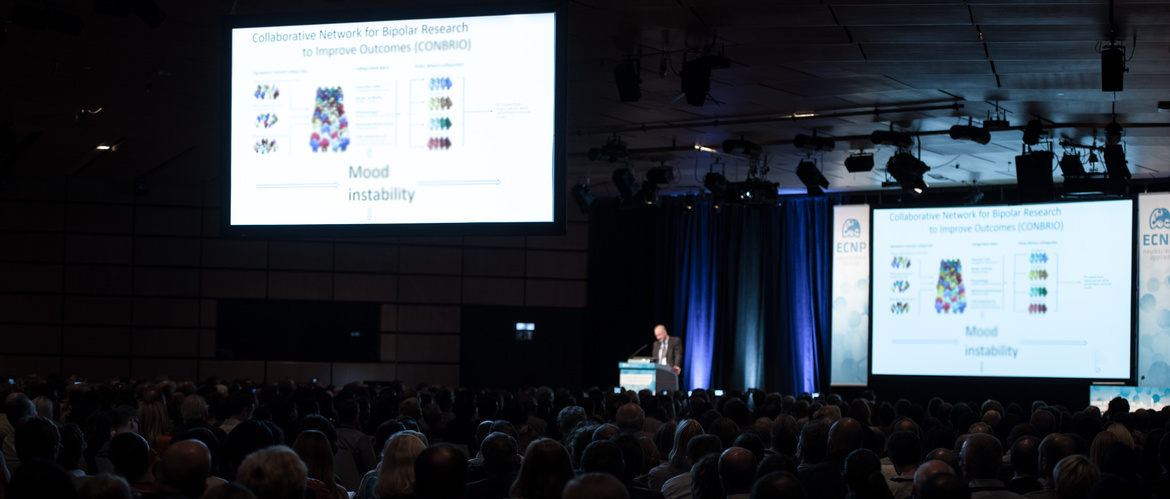
Choose a channel
Check out the different Progress in Mind content channels.

Progress in Mind

Historically, advances in the treatment of bipolar disorder (BD) have been, at best, slow and haphazard. Most of the drug treatments used in BD management today were appropriated or repurposed from other indications, rather than developed with BD in mind. But things are about to change. Each year the ECNP confers a Neuropsychopharmacology Award and invites the recipient to deliver a keynote lecture. There was standing-room only at the 2016 lecture by Professor John Geddes on the renewed quest and emerging opportunities for rekindling drug discovery in BD. We provide a top-line summary of a thought-provoking presentation.
Drug discovery is traditionally a slow and cumbersome process, occasionally aided by serendipity. For patients with bipolar disorder (BD), progress and breakthroughs have been particularly thin on the ground and even today understanding of the biological basis of BD remains poor.
Despite this history, Professor John Geddes of the Department of Psychiatry at Oxford University in the UK, believes that a new era in drug discovery in BD could be dawning, thanks to opportunities afforded by a number of scientific and technological advances.
Professor Geddes said that it is time to push the scientific study of BD to make it more cutting edge and he called for clinicians and scientists to avoid replication, collaborate more and find ways to integrate and advance preclinical and clinical research in parallel rather than sequentially.
According to Professor Geddes, new technologies and telemedicine that allow temporal data-collection are already being used to help better define the BD phenotype. He said that anamnesis will still have place in psychiatric assessment but that modern technologies and wearable devices able to record clinical symptoms and gather a myriad of biological data directly from patients will be more reliable in helping characterize patterns and mechanisms of disease, and predict disease course. Professor Geddes said that being able to closely follow patients with BD using new technologies is already helping to show that far from following a sine wave pattern of alternating depression and mania, BD appears to be a more chaotic condition of chronic mood instability.
Large-scale capture of data – clinical, biological and social – will need large-scale and sophisticated analysis, and Professor Geddes said that clinicians and scientists are looking to collaborate with mathematical minds, used to forecasting economic and financial outcomes, to help ensure the best treatment and assessment of complex datasets.
He described a number of studies and initiatives that are seeking to finger-print BD – such as the Collaborative Network for Bipolar Research to Improve Outcomes (CONBRIO) programme which will aim for example to assess cognitive and neural mechanisms in BD, look at structural and temporal changes, and measure neuronal stability. Specifically, within CONBRIO the AMoSS (automated monitoring of symptom severity) study will capture diverse data for people with BD – looking at heart variability and sleep patterns – and the COMET (cognition and mood evolution across time) study will explore mood instability and cognitive function using daily app-based tasks and MRI (Magnetic Resonance Imaging) and MEG (Magnetoencephalography) neuroimaging techniques.
Such studies should help inform the design of therapeutic and clinical studies in BD and may also offer clues and early warning signs to help predict mood changes in BD.
Professor Geddes said that there are also opportunities to study available data on existing drug treatments used in BD management – using that data to learn more about the targets that may matter in this disease. He reminded delegates that despite there being no unified or proven mechanisms of action to explain the efficacy of lithium in BD, this primodial element (created in the big bang) has acute antimanic effects and a wealth of data from both randomized controlled trials (RCT) and observational studies supporting its place in the BD therapeutic armamentarium.
Professor Geddes reminded the audience that remote data capture methods will allow clinicians to study the effects of treatments such as lithium in the whole body, understanding more about the mechanism of action of this agent and the neurobiology of BD. He briefly described a planned proof-of-concept RCT that will look at BD patients and assess self-reported mood, correlation between mood and cognitive performance, neurofunctional dynamics, circadian changes and a suite of biological and homeostatic markers in people receiving treatment.
Professor Geddes outlined that to support clinical research and drug discovery in BD – adaptive study designs offer a valuable way forward – allowing studies to evolve and develop as more is understood about endpoints, targets and variables of relevance to BD.
He also said that there are growing opportunities to use human cellular models – stem cell derived hyperexcitable neurons – to study the effects of existing drug treatments used in BD, and to explore and work with medicinal chemists and basic scientists the structure and function of, for example, calcium ion channels that may have a crucial role on BD biology and pharmacology.
Our correspondent’s highlights from the symposium are meant as a fair representation of the scientific content presented. The views and opinions expressed on this page do not necessarily reflect those of Lundbeck.